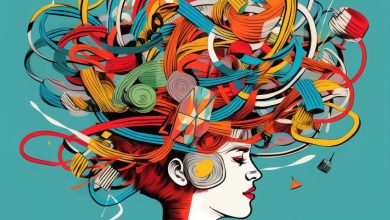What is Depression? | Causes, Symptoms & Treatment Options

What lies beneath the surface of an invisible pain that plagues so many lives? Depression, a silent battle fought by countless individuals, can cast a heavy cloud over life’s horizon. More than just sadness, it is a relentless mood disorder that steals joy and distorts perception. It affects individuals of all ages, undermining relationships, work, and overall well-being.
In this guide, we will provide clarity on depression. We’ll examine its underlying causes, identify the common symptoms, and explore the available treatment options.
What is Depression?
Depression, a mental health disorder with a broad array of emotional and physical symptoms, holds profound significance in the lives of countless individuals worldwide. According to the World Health Organization (WHO), more than 264 million people worldwide experience depression.

The meaning of depression goes beyond its symptoms, as it is a prevalent condition that can affect individuals of all ages, genders, and backgrounds. It is characterized by intense feelings of sadness, hopelessness, and emptiness which can interfere with a person’s ability to carry out everyday activities, work, study, maintain relationships, and experience enjoyment.
It’s important to recognize the differences between clinical depression and occasional sadness, which is a normal part of life. While occasional sadness is temporary and typically resolves within a short period, clinical depression involves persistent symptoms that endure for weeks, months, or even longer.
Symptoms of Depression
Depression is characterized by a wide range of symptoms that encompass both emotional and physical aspects. Some commonly observed symptoms include:
Emotional Symptoms:
- Persistent feelings of sadness, hopelessness, or emptiness
- Loss of interest or pleasure in activities once enjoyed
- Increased irritability or frustration
- Feelings of guilt, worthlessness, or excessive self-criticism
- Difficulty experiencing positive emotions
- Thoughts of death or suicide
Physical Symptoms:
- Changes in appetite, resulting in weight loss or gain
- Disturbed sleep patterns, such as insomnia or excessive sleeping
- Fatigue or loss of energy, even with minimal effort
- Slowed movements or restlessness
- Unexplained physical aches or pains, such as headaches or digestive issues
Diagnostic Criteria for Major Depressive Disorder
To diagnose major depressive disorder, also known as clinical depression, mental health professionals refer to specific criteria outlined in the Diagnostic and Statistical Manual of Mental Disorders (DSM-5). These criteria include:
- Depressed mood: Persistent feelings of sadness or a significant decrease in interest or pleasure in nearly all activities.
- Duration: Symptoms present most of the day, nearly every day, for at least two weeks.
- Additional symptoms: Presence of at least four or more symptoms from a specific list, including changes in appetite or weight, sleep disturbances, psychomotor agitation or retardation, fatigue or loss of energy, feelings of worthlessness or excessive guilt, difficulty concentrating or making decisions, and recurrent thoughts of death or suicide.

- Impairment: Symptoms significantly impair social, occupational, or other important areas of functioning.
- Exclusion: The symptoms are not better explained by another medical condition or substance use.
Meeting these criteria helps mental health professionals in diagnosing major depressive disorder and determining the appropriate treatment approach.
Types of Depression
Depression encompasses various types, each with unique characteristics, symptoms, and challenges. Understanding these different types can help individuals and healthcare professionals better identify and address specific needs. The following are common types of depression:
Major Depressive Disorder (MDD)
Major depressive disorder, also known as clinical depression, is the most prevalent and well-known form of depression. It is characterized by persistent feelings of sadness, hopelessness, and a loss of interest or pleasure in activities. Symptoms may include changes in appetite and weight, sleep disturbances, fatigue, difficulty concentrating, feelings of guilt or worthlessness, and recurrent thoughts of death or suicide.
Persistent Depressive Disorder (PDD)
Persistent depressive disorder, also referred to as dysthymia, is a chronic form of depression. Unlike major depressive disorder, PDD involves less severe but longer-lasting symptoms. These symptoms persist for at least two years in adults and one year in teenagers. Individuals with PDD often experience a consistently low mood, loss of interest, low self-esteem, and difficulties in daily functioning.
Postpartum Depression
Postpartum depression occurs in individuals after childbirth and is not exclusive to mothers. It affects both men and women and can start within weeks or months following the birth of a child. Symptoms may include intense mood swings, feelings of sadness, irritability, sleep disturbances, loss of appetite, and difficulties bonding with the baby. Postpartum depression requires prompt attention and support to ensure the well-being of both the parent and child.

Seasonal Affective Disorder (SAD)
The seasonal affective disorder is a type of depression that occurs with seasonal patterns, typically during the fall and winter months when there is less sunlight. Symptoms may include persistent low mood, lack of energy, increased need for sleep, carbohydrate cravings, weight gain, and withdrawal from social activities. SAD is thought to be related to changes in light exposure and can be effectively managed with light therapy, psychotherapy, and lifestyle adjustments.
Bipolar Disorder (Manic Depression)
Bipolar disorder is characterized by periods of depression alternating with periods of mania or hypomania. During depressive episodes, individuals experience symptoms similar to major depressive disorder. However, during manic or hypomanic episodes, they may exhibit heightened energy, grandiosity, increased risk-taking behavior, decreased need for sleep, racing thoughts, and impulsive actions. Bipolar disorder requires specialized treatment that addresses both the depressive and manic phases.
Risk Factors and Causes of Depression
Depression is a multifactorial condition influenced by a range of biological, psychological, and environmental factors that contribute to the development of depression.
The interplay between these factors is complex and can vary from person to person. It is often a combination of multiple factors that contribute to the onset and persistence of depression.

Genetic Predisposition and Family History
Genetics plays a role in the development of depression. Individuals with a family history of depression are at a higher risk of experiencing the condition themselves. Genetic factors can contribute to the regulation of neurotransmitters and brain circuits involved in mood regulation, potentially increasing vulnerability to depression.
Brain Chemistry Imbalances
Depression is associated with imbalances in certain neurotransmitters, such as serotonin, norepinephrine, and dopamine. These chemical messengers play a crucial role in regulating mood, emotions, and overall brain function. Disruptions in their functioning can contribute to the onset of depressive symptoms.
Psychological Factors
Psychological factors, such as personality traits and coping styles, can influence the development of depression. Individuals with low self-esteem, a negative outlook, perfectionistic tendencies, or a history of trauma or abuse may be more susceptible to depression. Additionally, individuals with certain psychiatric conditions, such as anxiety disorders, may have a higher risk of developing depression.
Environmental Stressors and Life Events
Stressful life events, such as the loss of a loved one, financial difficulties, relationship problems, or work-related stress, can trigger or contribute to the onset of depression. These events may overwhelm an individual’s ability to cope and lead to changes in brain chemistry and functioning.

Chronic Medical Conditions
Certain chronic medical conditions, such as diabetes, cardiovascular disease, chronic pain, and neurological disorders, can increase the risk of developing depression. The challenges of managing a chronic illness, along with the associated physical and emotional burden, can contribute to the development of depressive symptoms.
Substance Abuse and Addiction
Substance abuse can both contribute to the onset of depression and serve as a way for individuals to self-medicate their depressive symptoms. The intertwined relationship between depression and substance abuse requires comprehensive treatment approaches that address both conditions simultaneously.
Social Isolation and Lack of Support
The absence of social connections and supportive relationships can lead to feelings of despair, increased stress, and a lack of coping resources.
Treatment Options for Depression
There are various treatment options available, tailored to individual needs and preferences. These options include:
- Psychotherapy: Talk therapy or psychotherapy , involves working with a trained therapist to explore and address the underlying causes and triggers of depression. Several types of psychotherapy have shown efficacy in treating depression:
- Cognitive-Behavioral Therapy (CBT): CBT focuses on identifying and modifying negative thought patterns and behaviors associated with depression. It helps individuals develop healthier coping strategies, change distorted thinking patterns, and set realistic goals.

- Interpersonal Therapy (IPT): IPT focuses on improving interpersonal relationships and social functioning. It helps individuals address relationship conflicts, life transitions, and social isolation that may contribute to depressive symptoms.
- Psychodynamic Therapy: This form of therapy explores unconscious patterns and unresolved conflicts that may contribute to depression. It aims to increase self-awareness, understanding of emotions, and the ability to manage them effectively.
Medication
Depression medication can play a crucial role in managing symptoms, particularly in moderate to severe cases. According to WebMD, antidepressant medications, such as selective serotonin reuptake inhibitors (SSRIs), serotonin-norepinephrine reuptake inhibitors (SNRIs), and tricyclic antidepressants (TCAs), work by balancing brain chemistry and alleviating depressive symptoms. It is important to work closely with a healthcare professional to find the most appropriate medication and dosage, as individual responses to medications may vary.
Complementary Approaches
In addition to psychotherapy and medication, several alternative and complementary approaches can support the management of depression:
- Exercise: Regular physical exercise, such as aerobic activities or strength training, has been shown to improve mood and reduce depressive symptoms. Exercise stimulates the release of endorphins and other mood-enhancing chemicals in the brain.
- Mindfulness and Meditation: Mindfulness-based approaches, such as mindfulness-based cognitive therapy (MBCT) and mindfulness-based stress reduction (MBSR), can help individuals develop awareness of their thoughts and emotions, reducing stress and promoting emotional well-being.

- Herbal Supplements: Some individuals explore the use of herbal supplements such as St. John’s wort, omega-3 fatty acids, and S-adenosyl methionine (SAMe) as potential adjunctive treatments for depression. However, it is essential to consult with a healthcare professional before using any herbal supplements, as they can interact with medications and vary in effectiveness.
Lifestyle Changes
Engaging in depression self-care practices and making positive lifestyle changes can significantly impact overall well-being and aid in the management of symptoms. These may include:
- Establishing a consistent sleep schedule
- Incorporating regular physical activity into daily routines
- Eating a balanced diet that includes nutrient-rich foods
- Avoiding excessive alcohol or substance use
- Seeking social support from loved ones or support groups
- Engaging in activities that bring joy and fulfillment
- Managing stress through relaxation techniques or stress-reduction strategies
Tips for Supporting a Loved One with Depression

Supporting someone with depression requires patience, understanding, and empathy. Here are some tips to help you provide effective support to your loved one:
- Educate Yourself
Take the time to learn about depression and its symptoms, causes, and available treatment options. Understanding the condition can help you empathize with your loved one and respond in a supportive manner.
- Communicate with Empathy
When talking to your loved one, approach them with empathy and understanding. Use active listening skills to show that you genuinely care about their feelings and experiences. Avoid judgment or minimizing their emotions.
- Be Non-judgmental
Create a safe and non-judgmental environment where your loved one feels comfortable expressing their thoughts and emotions. Let them know that you are there to listen without offering unsolicited advice or criticism.
- Encourage Professional Help
While your support is valuable, encourage your loved one to seek professional help from a therapist, counselor, or psychiatrist. Offer to assist them in finding a suitable healthcare provider and accompany them to appointments if they feel comfortable.
- Offer Practical Support
Help your loved one with daily tasks that may feel overwhelming to them, such as cooking meals, running errands, or organizing their living space. Offering practical support can alleviate some of the stress they may be experiencing.
- Encourage Healthy Habits
Support your loved one in maintaining healthy lifestyle habits. Encourage them to engage in regular physical exercise, eat nutritious meals, get enough sleep, and avoid excessive alcohol or drug use.
- Be Patient
Recovery from depression takes time, and there may be ups and downs along the way. Practice patience and understanding, acknowledging that progress may be gradual. Avoid putting pressure on your loved one or expecting them to “snap out of it.”
- Take Care of Yourself
Supporting someone with depression can be emotionally draining. It is crucial to prioritize your own self-care and seek support for yourself. Engage in activities that help you relax and recharge, and consider joining a support group for caregivers.
- Encourage Social Connection
Help your loved one maintain social connections and engage in activities they enjoy. Encourage them to spend time with supportive friends and family members or participate in support groups where they can connect with others who understand their experiences.
- Provide Resources
Offer information about reputable resources, websites, and helplines that provide additional information about depression and support for individuals and their loved ones. Encourage them to explore these resources and seek professional assistance when needed.
Remember…
…each person’s experience with depression is unique, so adapt your support to their individual needs. Encouraging professional help and creating a supportive environment can make a significant difference in their journey toward recovery.
HealWiser’s Last Piece of Advice
Whether you are personally experiencing depression or supporting a loved one, remember that recovery is possible with the right resources and treatment.
Reach out to mental health professionals, engage in self-care practices, and lean on your support network. Remember, you are not alone, and there is hope for a brighter future.
Share your experience with HealWiser and others in the comments section below this post.






